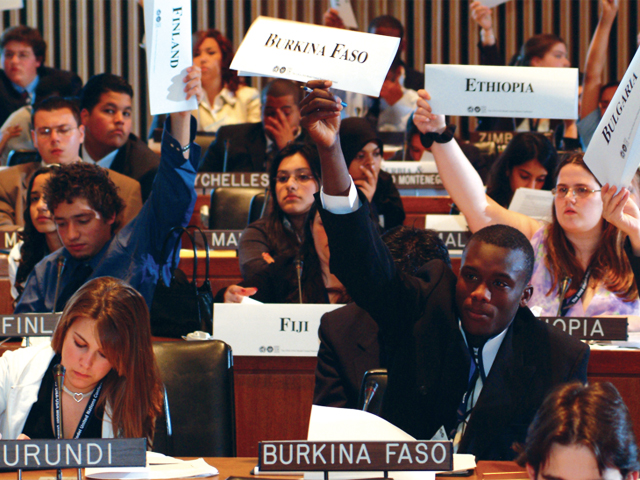Unleashing Diplomatic Delights: A Beginner's Guide to MUN Success!
Navigating the World of Model United Nations: A Comprehensive Guide for
Beginners

Model United Nations (MUN) is an academic simulation that replicates the United Nations and other international organizations, where students take on the roles of delegates representing different countries. MUN conferences provide an exceptional platform for students to engage in diplomacy, critical thinking, public speaking, and problem-solving. This comprehensive guide is designed to help beginners navigate the world of MUN from the General Speakers List (GSL) to crafting a resolution, fostering a deeper understanding of each stage and maximizing their MUN experience.
1. Understanding the Basics of MUN:
Before delving into the intricacies of MUN, it is crucial to grasp the fundamentals. MUN's primary goal is to simulate the diplomatic processes and decision-making within international bodies. Delegates are assigned to various committees, each with specific topics to discuss and resolve. The Rules of Procedure dictate the conduct of the conference, encompassing speaking time, resolution submissions, and voting procedures. Becoming well-versed in the Rules of Procedure ensures smooth participation during committee sessions.
2. Researching Your Topic and Country:
In MUN, knowledge is power. Effective research is fundamental to construct informed and well-grounded arguments. Thoroughly researching the assigned topic is vital, including understanding its historical context, current challenges, and the efforts undertaken by the international community to address it. Utilize reputable sources such as official documents, academic papers, and reliable news outlets to gather accurate information.
Equally important is researching the country assigned to you. Understanding your country's policies, past actions, and official statements enables you to form an authentic and coherent stance during the debates. By incorporating your country's specific interests and diplomatic history, you can contribute meaningfully to the discussions.
3. Writing an Opening Statement:
The opening statement is your first opportunity to present your country's position on the topic. It should be concise, impactful, and tailored to the committee's context. Begin with a brief introduction of your country, emphasizing its role in the international community. Clearly state your country's stance on the topic and highlight key points and potential solutions you plan to address during the GSL. A well-crafted opening statement sets the stage for constructive engagement with other delegates.
4. Excelling in the General Speakers List (GSL):
The GSL is a significant segment of MUN conferences, allowing delegates to present their opening statements. When recognized by the chair, confidently deliver your opening statement, relying on research and knowledge to support your country's position. Articulate your stance clearly, ensuring it aligns with your country's interests and global responsibilities. Be prepared to answer questions from other delegates, as this is an excellent opportunity to build alliances and foster cooperation.
5. Engaging in Unmoderated Caucuses:
Unmoderated caucuses are informal sessions where delegates collaborate, form alliances, and draft working papers. Networking with other delegates during this time is crucial to building relationships and alliances. Engage in discussions, share perspectives, and explore common ground with other countries. Unmoderated caucuses are ideal for initiating collaborative efforts to address the topic effectively.
6. Drafting Working Papers and Resolutions:
Working papers are collaborative documents that lay the foundation for resolutions. Delegates from different countries work together to outline potential solutions and address the issue at hand. An effective working paper must be coherent, feasible, and well-structured. Ensure it includes clear policy proposals, strategies, and practical steps towards solving the problem at hand. Collaborate with other delegates, listen to their perspectives, and reach consensus to strengthen the working paper.
7. Forming Blocs and Negotiating:
In MUN, forming alliances or blocs with like-minded countries enhances your influence and strengthens your resolution's chances of passing. Seek out countries that share similar interests and align with your country's stance on the topic. Forming a cohesive bloc allows for coordinated efforts and strategic negotiations during debates. Engage in diplomatic negotiations, propose amendments to the working paper, and discuss compromises with other delegates to build consensus.
8. Advocating in Moderated Caucuses:
Moderated caucuses are formal debates where delegates discuss specific aspects of the resolution. Articulate clear arguments, respond to questions from other delegates, and defend your resolution against criticism during these sessions. Advocate for your resolution, highlighting its merits and demonstrating how it effectively addresses the topic.
9. Finalizing and Presenting the Resolution:
Revisions and amendments may be necessary during the MUN process. Work collaboratively with your bloc members to finalize the resolution, incorporating feedback and reflecting the committee's discussions. Ensure that the resolution is concise, comprehensive, and reflects the interests of the countries involved. Present the final resolution effectively during the final debate, showcasing its relevance and contribution to solving the global issue at hand.
10. Voting and Reflecting:
During voting, delegates advocate for their resolution and persuade others to support it. Voting plays a pivotal role in determining the adoption of resolutions. Encourage other delegates to support your resolution, emphasizing its merits and the consensus built during the conference.
After the MUN conference, take time to reflect on your experience. Evaluate your performance, identify areas of improvement, and celebrate your achievements. Embrace the lessons learned and the growth achieved during the conference, as MUN is not only about honing skills but also developing a deeper understanding of global issues and diplomacy.

Conclusion
Participating in Model United Nations offers an enriching and transformative experience for students. By mastering each step, from understanding MUN basics to crafting resolutions, delegates can engage in meaningful debates and contribute to finding solutions to global challenges. Embrace the spirit of diplomacy, engage in constructive debates, and approach MUN as a platform for learning, growth, and making a positive impact on the world. With dedication, preparation, and a commitment to collaboration, students can excel in MUN and foster a deeper understanding of international relations and global issues. Happy MUN-ing!
Comments
Post a Comment